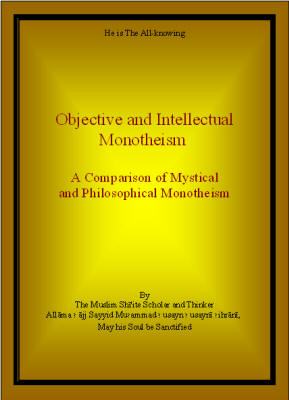
The god carved out of subjective contrivances is not worth worshipping!
Subject of the Book : Difference between the God that is Known just Through Mind and the God that is Touched by the Heart
■Why is God One?
■ Does Oneness of God mean His being one (as a number) or His being Infinite?
■ What kind of being is the Infinite Being?
■ What does God do in realm of being?
■ How are the world affairs managed?
■ How is God related to creatures?
■ What difference is there between the mystical attitude and philosophical attitude toward existence?
■ Which attitude is confirmed by religious sources?
It consists of philosophical and mystical letters exchanged between the two renowned scholars, Haj Sayyid Ahmad Karbalā’ī and Haj Shaykh Muhammad Husayn Isfahānī (Kumpānī) concerning a verse by ‘Attār Nayshābūrī on which the both eminent scholars have presented their interpretations according to their own personal – mystical and philosophical – taste.
Since these letters include painstaking monotheistic, mystical, philosophical, and demonstrative discussions, his holiness Allama Tabātabā’ī, may God sanctify his soul, during his teaching sessions has written six marginal notes and judgments on the first three letters of the late Shaykh and Sayyid; and his holiness Ayatollah Allama Tihrānī, may God sanctify his soul, has written eight marginal notes on four other letters of the late Shaykh and Sayyid as supplements to Allama Tabātabā’ī’s marginal notes.
In this collection, an introduction is also given about the original identity of the letters and the noble mystics whom they have talked about in these letters.
Excerpts from the book:
• God is the Infinite Being, and the coexistence of two infinite beings is not logical.
• No creature has any independence of its own, nor can it have any self-reliance.
• Discovering the creatures’ lack of independence requires going beyond their material aspects and taking a look into their existential reality.
• The mystics’ utterances concern Divine Unity (Tawhīd) rather than incarnation or association.
• Only the mystics have perceived Tawhīd.
• Principality of essence is the cornerstone of materialism.
• True Tawhīd is not compatible with existential skepticism.
• The mystics view skepticism applicable to appearances rather than to epiphanies.
• At the station of Essence everything, even the names and attributes, are transient.
• The external world is the demotion of the world of archetypal images, which in turn is the demotion of the world of intelligence.
• The greatest of the veils is dealing with the words and forgetting the truths and meanings.
• The knower of Allah (‘ārif-i bi’llāh) is confirmed by religious law, demonstrative proof, and intuition.
This volume contains 14 letters exchanged between the late Ayatollah Haj Sayyid Ahmad Karbalā’ī and the late Ayatollah Haj Shaykh Muhammad Husayn Isfahānī (Kumpānī) concerning their comments on the mystics’ Tawhīd and the philosophers’ Tawhīd.
The late Allama Tabātabā’ī has annotated the first seven letters and his student, the late Allama Tihrānī has commented on the rest of the correspondence.
Persian full text